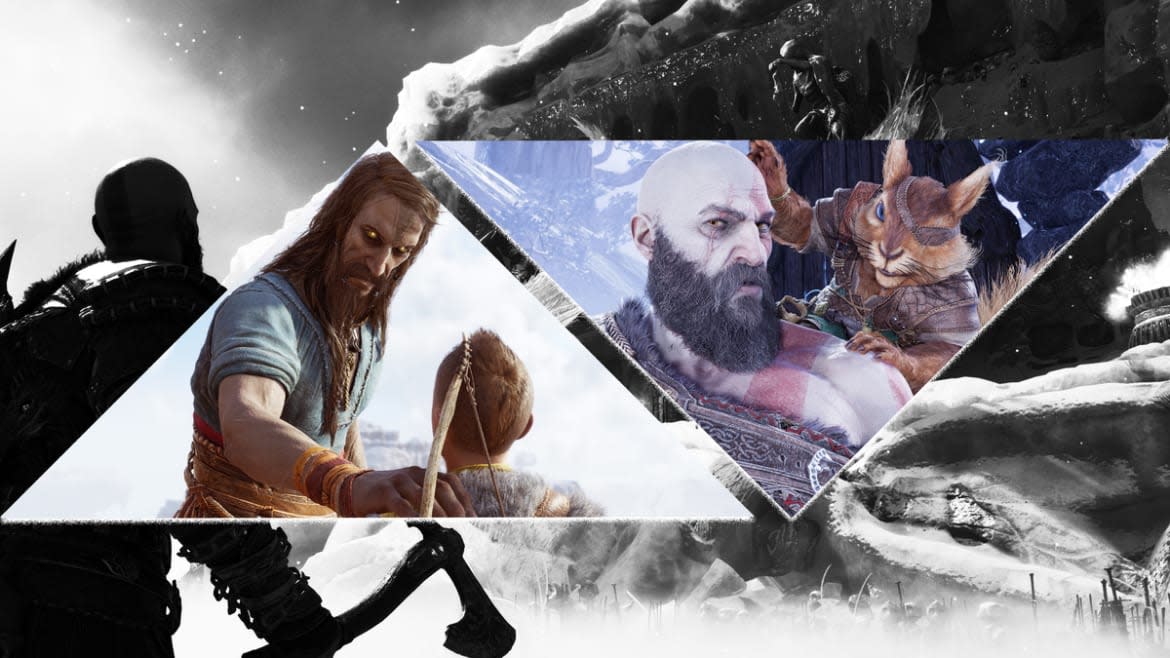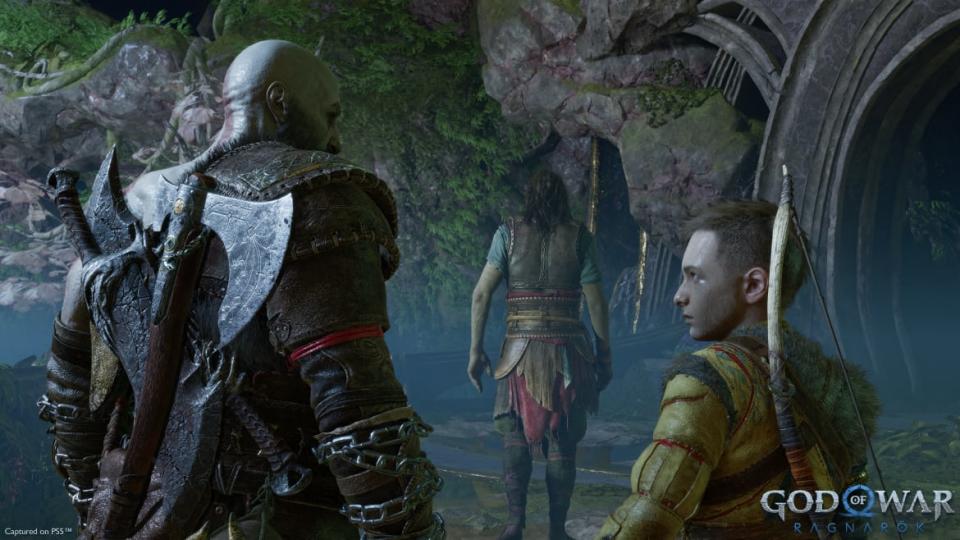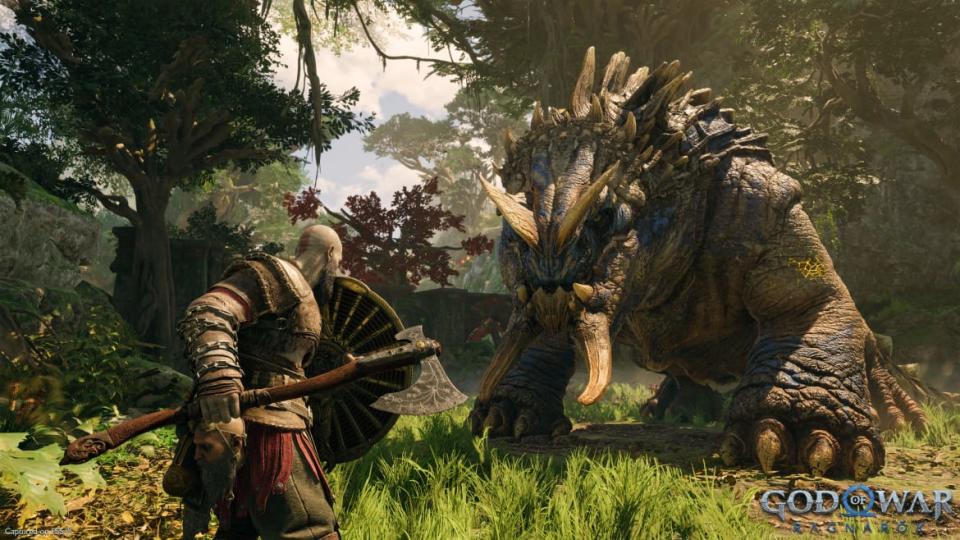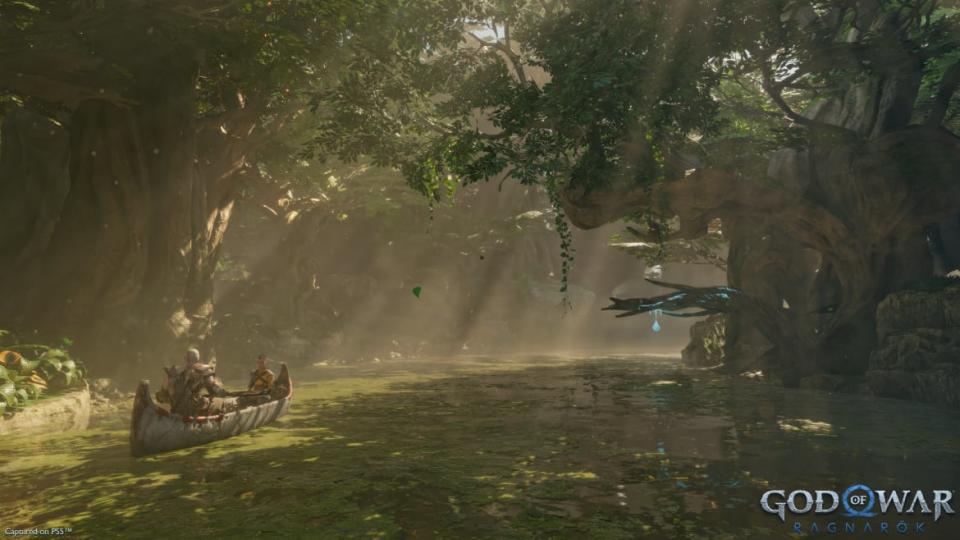‘God of War’ Comes of Age in the Year’s Best Video Game

- Oops!Something went wrong.Please try again later.
By the time credits rolled on God of War: Ragnarök, I had already cried several times. This is not necessarily a commentary on anyone’s fate in the game (and no, I will not reveal any fates). Instead, it’s a commendation. The new installment in the PlayStation game franchise isn’t just a fantastic game in itself—one of the year’s best—but Ragnarök is also an unforgettable story about the woes of growing up.
This game is incredibly violent, as any game called God of War should be. Ragnarök is even surprisingly funny at times. And it is a lot of fun to play. But it is also a gripping story, ruminating on fate, the consequences of our choices, and what truly defines the future. These themes are lurking around every corner over the game—just as was the case with its predecessor, 2018’s God of War, which delved into heavy topics such as loss and the weight of parenthood. With Ragnarök, they are even more strongly represented, their intensity elevated. The stakes are higher. The emotions run deeper. And the story is even richer.
When we first met war god Kratos (Christopher Judge) and his son Atreus (Sunny Suljic) in the previous game, the father-son pair were laying their wife/mother, Faye, to rest, before setting off on a journey to fulfill her final wish: spreading her ashes at the highest peak in all the realms. As Kratos, players slashed their way through enemies while learning more about his mysterious backstory and the truth about who Atreus really is.

Kratos was the focus of God of War, but setting the story years later makes Ragnarök decidedly Atreus’ game. Atreus (aka Loki) is now a full-blown teenager, a narrative development which comes across through the spectacular vocal and performance capture work. Actor Sunny Suljic’s vocal change from the 2018 game is quite jarring, and it was even a noted obstacle in the production of the game. (“Puberty hath dropped” is one of the first notes I took when I heard Atreus speak in the sequel.)
Atreus seeks to learn more about the prophecy of “Loki”—which you find out at the end of God of War is (SPOILER!) his actual name—and his role in Ragnarök, Norse mythology’s big battle and world-ending series of events. With Ragnarök finally nearing, he’s ready to face his destiny, whatever that may be. The journey he embarks upon to do so takes Atreus across the foretold nine realms, toughing out the wintery landscape that foretells of the oncoming apocalypse.
As much of a coming-of-age story as Ragnarök is for his son, Kratos also goes through a pivotal moment. You play as both characters throughout the roughly 25-hour main storyline. While Atreus’ problems are personal and material, Kratos’ are a bit more existential. He is facing the hardest moment any parent must face: his child growing up and leaving the nest. Seeing a badass Spartan God, who can obliterate 100 enemies at once, face this very real-world challenge with the same turmoil as any human is a strong, relatable storytelling choice. If a literal Greek God is having trouble overcoming a very common emotional obstacle, it makes you feel a little bit better and more equipped to face any and all of life's challenges.
But it’s playing as Atreus that resonates most. Shifting focus toward the next generation of heroes establishes Ragnarök as something different, maybe even more mature than the first game. In God of War, Atreus was too young to leave his dad’s side. Now, Atreus can venture out on his own and make his own decision—good or bad. While Atreus striking out on his own directly ties into Kratos’ story, his struggles get as much care and specificity to stand alone as Kratos’ did in the original. Allowing the two characters to develop together but separately is a risky choice that the game pulls off.

A big part of how the game carves out Atreus’ story is through introducing new characters. You will recognize many of them because of their prominence in Norse mythology (or Thor films), from Týr to Odin to Freya—to even Thor himself. But in this game, they are given new life and complexities. Ragnarök builds each of their stories out away from their mythological origins, making you care for these fantastical characters in a new, grounded way.
Getting to play as Atreus makes every interaction with these characters more poignant too. His naïveté around strangers imbues every conversation with a special texture: Atreus sees the best in people, but sometimes he runs into the worst, and sometimes they come through for you. One of the best parts about the game is how any character can surprise you, from the people you know and love to the ones you’ve just met.
Both the new and returning characters constantly reveal new layers to their stories and personal vulnerabilities every time Kratos and Atreus encounter them. It’s a testament to the game’s superb writing and vocal performances, which really makes all the emotional moments of the story that much more devastating.
I won’t get too specific, because there isn't a second of this game I want to spoil. But one of the moments that made me most emotional comes early on, when you take control as Atreus for one of the first times. It’s during one of the game’s earlier chapters, a place made up of stunning scenery and vibrant characters that make you feel as though you have been truly transported into this realm. Whether Atreus is riding a yak through shallow waters or running alongside a pack of wolves, the freedom both he and the player feel in this realm is palpable.

While there, Atreus has an experience that is truly beautiful: For a second, the weight of the looming battle drops from his shoulders, as Atreus interacts with someone his own age for once. And there is even the slightest hint of a crush. The moment changed Ragnarök from a fantastical war epic into an adorable teen movie, if only for a moment. It’s a heartwarming reprieve for both the player and the character, made more so through the game’s stellar graphics and camera work.
The visual design plays a huge part in the game’s success. Ragnarök is just as technically marvelous as its predecessor. The cinematic, non-playable scenes are beautiful, with gorgeous cinematography that captures every intricate detail of the realms landscape. The game also re-uses the previous entry’s unique “one-shot” visual approach. It makes the game appear as it unfurls in a single “take” with no pesky load screens or scenery shifts, and it’s still impressive. This technique also adds the epic nature of the story by bringing a layer of gravitas. It gives off major blockbuster movie vibes, but it’s even better, because you feel like you are a part of that blockbuster.
The very best video game stories take you to a different world, make you feel every emotion, and leave you thinking about the choices you’ve made to affect it, long after it’s over. God of War: Ragnarök has all of this and more, easily making it one of the PlayStation 4 and PlayStation 5’s must-play games. It’s an impressive storytelling and visual feat that never stands in its parent’s shadow, just like Atreus.
God of War: Ragnarök will be released Nov. 9.
Get the Daily Beast's biggest scoops and scandals delivered right to your inbox. Sign up now.
Stay informed and gain unlimited access to the Daily Beast's unmatched reporting. Subscribe now.

